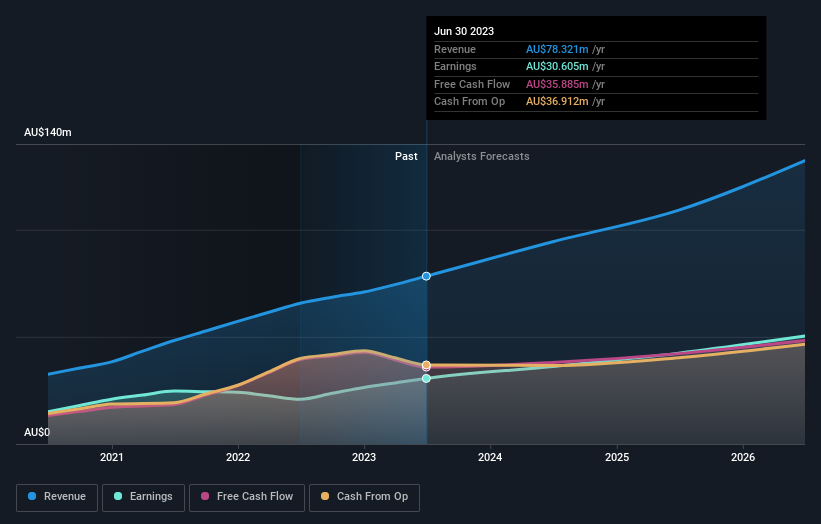Clinuvel Pharmaceuticals Limited's (ASX:CUV) largest shareholders are retail investors with 59% ownership, institutions own 20%
Key Insights
Clinuvel Pharmaceuticals' significant retail investors ownership suggests that the key decisions are influenced by shareholders from the larger public
39% of the business is held by the top 25 shareholders
A look at the shareholders of Clinuvel Pharmaceuticals Limited (ASX:CUV) can tell us which group is most powerful. The group holding the most number of shares in the company, around 59% to be precise, is retail investors. Put another way, the group faces the maximum upside potential (or downside risk).
And institutions on the other hand have a 20% ownership in the company. Institutions will often hold stock in bigger companies, and we expect to see insiders owning a noticeable percentage of the smaller ones.
Let's delve deeper into each type of owner of Clinuvel Pharmaceuticals, beginning with the chart below.
See our latest analysis for Clinuvel Pharmaceuticals
What Does The Institutional Ownership Tell Us About Clinuvel Pharmaceuticals?
Institutional investors commonly compare their own returns to the returns of a commonly followed index. So they generally do consider buying larger companies that are included in the relevant benchmark index.
Clinuvel Pharmaceuticals already has institutions on the share registry. Indeed, they own a respectable stake in the company. This can indicate that the company has a certain degree of credibility in the investment community. However, it is best to be wary of relying on the supposed validation that comes with institutional investors. They too, get it wrong sometimes. It is not uncommon to see a big share price drop if two large institutional investors try to sell out of a stock at the same time. So it is worth checking the past earnings trajectory of Clinuvel Pharmaceuticals, (below). Of course, keep in mind that there are other factors to consider, too.
Hedge funds don't have many shares in Clinuvel Pharmaceuticals. BNY Mellon Asset Management is currently the company's largest shareholder with 8.7% of shares outstanding. For context, the second largest shareholder holds about 6.3% of the shares outstanding, followed by an ownership of 5.2% by the third-largest shareholder. Philippe Wolgen, who is the second-largest shareholder, also happens to hold the title of Chief Executive Officer.
On studying our ownership data, we found that 25 of the top shareholders collectively own less than 50% of the share register, implying that no single individual has a majority interest.
While studying institutional ownership for a company can add value to your research, it is also a good practice to research analyst recommendations to get a deeper understand of a stock's expected performance. There are a reasonable number of analysts covering the stock, so it might be useful to find out their aggregate view on the future.
Insider Ownership Of Clinuvel Pharmaceuticals
The definition of company insiders can be subjective and does vary between jurisdictions. Our data reflects individual insiders, capturing board members at the very least. Company management run the business, but the CEO will answer to the board, even if he or she is a member of it.
Most consider insider ownership a positive because it can indicate the board is well aligned with other shareholders. However, on some occasions too much power is concentrated within this group.
It seems insiders own a significant proportion of Clinuvel Pharmaceuticals Limited. Insiders have a AU$113m stake in this AU$868m business. It is great to see insiders so invested in the business. It might be worth checking if those insiders have been buying recently.
General Public Ownership
The general public, mostly comprising of individual investors, collectively holds 59% of Clinuvel Pharmaceuticals shares. This size of ownership gives investors from the general public some collective power. They can and probably do influence decisions on executive compensation, dividend policies and proposed business acquisitions.
Private Company Ownership
Our data indicates that Private Companies hold 6.7%, of the company's shares. It's hard to draw any conclusions from this fact alone, so its worth looking into who owns those private companies. Sometimes insiders or other related parties have an interest in shares in a public company through a separate private company.
Next Steps:
While it is well worth considering the different groups that own a company, there are other factors that are even more important.
I always like to check for a history of revenue growth. You can too, by accessing this free chart of historic revenue and earnings in this detailed graph.
If you are like me, you may want to think about whether this company will grow or shrink. Luckily, you can check this free report showing analyst forecasts for its future.
NB: Figures in this article are calculated using data from the last twelve months, which refer to the 12-month period ending on the last date of the month the financial statement is dated. This may not be consistent with full year annual report figures.
Have feedback on this article? Concerned about the content? Get in touch with us directly. Alternatively, email editorial-team (at) simplywallst.com.
This article by Simply Wall St is general in nature. We provide commentary based on historical data and analyst forecasts only using an unbiased methodology and our articles are not intended to be financial advice. It does not constitute a recommendation to buy or sell any stock, and does not take account of your objectives, or your financial situation. We aim to bring you long-term focused analysis driven by fundamental data. Note that our analysis may not factor in the latest price-sensitive company announcements or qualitative material. Simply Wall St has no position in any stocks mentioned.

 Yahoo Finance
Yahoo Finance 

